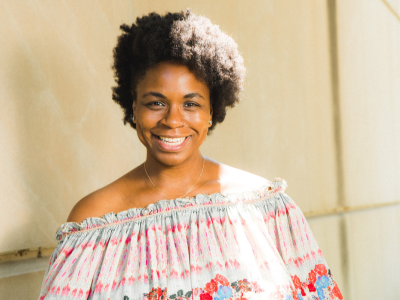Up Next: ANTIGONE
Last season, Associate Artistic Director Gabrielle Randle-Bent directed The Island, a South African protest play rooted in Antigone. This season, she is returning to those roots and directing Sophocles’s masterpiece.

Antigone’s brothers have murdered each other in a civil war and she is in the depths of mourning. Her victorious brother is posthumously exalted; her treasonous brother is left unburied by order of King Creon, Antigone’s uncle and adversary. Antigone deliberately defies the king’s edict and buries her traitorous brother, igniting a devastating chain of events and imploring citizens of Thebes (and theatergoers alike) to reckon with the true meaning of justice.
With Antigone, Randle-Bent brings Court’s Oedipus Trilogy – Oedipus Rex, The Gospel at Colonus, and Antigone – to an exhilarating conclusion. Her interpretation of Founding Artistic Director Nicholas Rudall’s translation not only completes this theatrical odyssey, but renders Sophocles’s classic tale electrifyingly alive.
Below is a brief excerpt from a conversation between Randle-Bent and Camille Oswald, Court’s Associate Director of Marketing, in which Randle-Bent shares what excites her and why there is an Antigone for every era.
First of all, I’m incredibly excited about the language of Antigone. You might know that we’re using [Founding Artistic Director] Nicholas Rudall’s translation, but what you may not know is that Nick – a brilliant writer and adapter – was deeply influenced by his grandfather, who was a working-class Welsh poet. Nick’s daughter, Clare, described to me how he recognized the poetry of his grandfather’s Welsh brogue in the lyricism and cadence he heard in Bronzeville. We see that in the translation: the choral odes are pure poetry. This language just lends itself really well to Chicago ears and voices. So the language, of course, is a huge draw, but I’m also deeply moved by the prospect of creating this text grounded in Black feminist praxis; to explore what it means, for the younger Black women working on this piece, to be surrounded by the powerful Black women icons who will be in this production with them. To dive into that concept of legacy.

Of course, this play is itself about legacy, but it also has a special place in Court’s legacy as an institution. The Oedipus Trilogy has been a years-long undertaking building on Nick’s passion, Charlie’s stewardship, my own discovery, and the work of generations of talented artists, designers, crew, and Court Theatre staff. Inevitably, by virtue of the sheer magnitude of the investment in ancient Greek narrative, we’re left with a story that’s incredibly rich and powerfully fertile. We’ve all been able to contribute and build out the world of this trilogy, but each play is grounded in its own artistic vision in support of that theatrical whole.
For me, the thing that’s so interesting about Antigone, the thing that people are most interested in, isn’t the legacy of the play. It’s how this play comes back over, and over, and over again and manifests in different ways. People are interested in the enduring legacy of this story, and why it keeps coming back, and when it keeps coming back. We rarely choose Antigone – it chooses its moment – so the question then becomes, ‘What is it about now that means that we need Antigone?’ The play just…shows up! [laughs] Even now, even this production – even though we chose to produce it four years ago – feels really right for right now.
Antigone has chosen this moment, and we hope you will too. We invite you to join us.
Antigone is on stage from February 2 – 25, 2024 and tickets are available now! Subscriptions including this production are also available and can be purchased online or by calling the Box Office at (773) 753-4472.